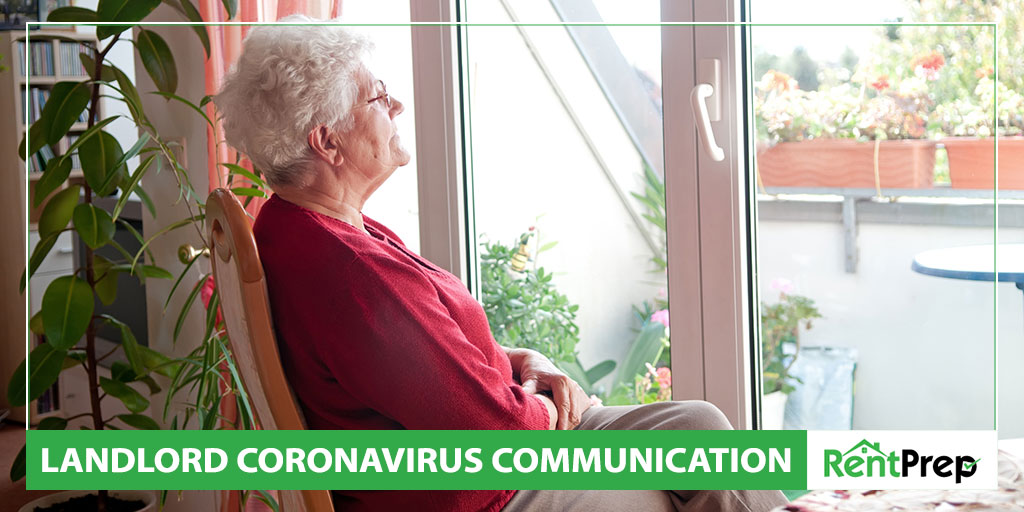
As the COVID-19 virus pandemic escalates in scale in America, as a landlord or property manager, you’ll need to prepare yourself for tenant concerns early on.
It’s imperative that you take time to become informed about what you need to do to protect your business, property, and tenants as much as possible.
While there are still a lot of questions that will need to be answered as time goes on, these are some basics that you can prepare for now to be proactive about this ongoing concern.
Table Of Contents For Managing COVID-19 As A Landlord
- #1: Send Out Letters To Tenants
- #2: Managing Tenant Fears
- #3: What To Do If A Tenant Believes They Are Infected
- #4: Rent & Other Issues
- #5: Pay Attention: Check CDC Frequently
#1: Send Out Letters To Tenants
As this is a very stressful time for many people in America, it may be a good idea to send out a letter to tenants, particularly to those living in multi-unit buildings. This letter can include basic information about the risks of the virus as well as what you are doing to protect common spaces. It will help tenants to understand the ongoing and help the country to fight this infectious spread together.
Here are a few topics that we suggest covering:
- What a tenant should do if they are at risk of exposure or showing virus symptoms
- How and when common areas are being disinfected
- How rent should be delivered with no person-to-person contact
- Where they can contact facilities if the building offices are shut down
The changes being caused by this pandemic are disrupting many parts of everyday life, so it is natural that your tenants are going to have questions. While you can self-isolate and take aggressive precautions, tenant communication should be a crucial part of your plan.
It’s also a good idea to remind tenants that only toilet paper should be flushed down the toilets. Items such as napkins, paper towels, and wet wipes will clog the pipes and create further issues.
#2: Managing Tenant Fears
The best thing that you can do to help your tenants to manage their fear and anxiety about the pandemic affecting the world is to help them get educated.
Connect tenants with resources that will help them to get educated:
- What Everyone Should Know About COVID-19 (CDC brochure)
- How To Prevent Disease Spread (CDC graphic)
- What To Do If You Get Sick (CDC site)
Additionally, you can reassure tenants by reminding them that you are cleaning common areas as much as possible. It is also a good idea to encourage self-isolation and working from home if it is possible for them as this is the leading suggestion from the CDC and various state governments at this time to avoid getting sick and prevent disease spread.
In order to slow the spread of this infectious disease in America, everyone needs to work together. Creating open communication with your tenants about how to do this will help not just your tenant but the rest of your local community as well.
#3: What To Do If A Tenant Believes They Are Infected

If a tenant believes they might be infected with COVID-19, direct them to the CDC’s website so that they can decide what to do next.
As of writing this article, the CDC suggests the following:
- Check your symptoms (fever, cough, shortness of breath)
- Call your doctor if you have these symptoms or know you were exposed to a confirmed case
- Follow the doctor’s instructions
- For mild symptoms, doctors may recommend you do self-care at home rather than come in for testing
- For at-risk groups and more severe symptoms, doctors will direct you on where and how to get tested
- Wear a mask when leaving the house and take precautions to avoid spreading the disease
This is a simplified version of the CDC’s guidance; be sure to give anyone who believes they may be infected access to the complete information. Do not meet with the tenant directly as this would put you and other tenants at-risk as well.
#4: Rent & Lease Concerns Issues
Chances are that your lease does not address what considerations need to be made during a viral pandemic, and while HUD has made some suggestions, there is not yet clear guidance on many issues that landlords and tenants may face during this time.
If you have a tenant that loses their job or has their hours severely cut due to the quarantine measures being taken at both local and national levels, there is a chance that those tenants will not be able to make their rental payment.
Many companies are paying catastrophe pay in cases where employees must quarantine, and unemployment payment should be available to anyone who has their hours cut or job erased completely because of this outbreak. It may, however, take time for the tenant to sort that out.
There isn’t a clear answer to what is the right thing to do in this situation, so it is best to get in contact with your local housing committees as well as the state housing boards to find out if there is any type of emergency funding available to tide rent payments over in these situations.
Processing an eviction at this time, in these circumstances, is sure to be tricky as well as uncomfortable to do since the fact of the matter is that it is out of the tenant’s control. New York State and others have suspended eviction proceedings indefinitely.
Your first priority should be to help your tenants find access to disaster relief pay so that they can make rent. Look to local and state guidelines for more ideas on how to proceed should you find yourself in this difficult situation.
#5: Pay Attention: Check CDC Frequently
The situation is constantly evolving, so there isn’t a single right path to follow that will hold true in the coming days, weeks, and months. In fact, it’s impossible to know exactly what will happen as the spread continues.
That is why it is so important to stay updated.
For the most current information about the coronavirus in America, check the CDC website dedicated to COVID-19. Be sure that your tenants are aware of this link as well, as it can be a useful guide to know what to do in times of crisis.
This website is packed with information from how the disease is spread to suggested disinfecting techniques. This information can be useful for you for your building common areas and offices, and it can also be useful for your tenants who are likely to become very concerned in the near future.
By monitoring this site for updates, you’ll be as prepared as possible for the future of dealing with the COVID outbreak in America.

